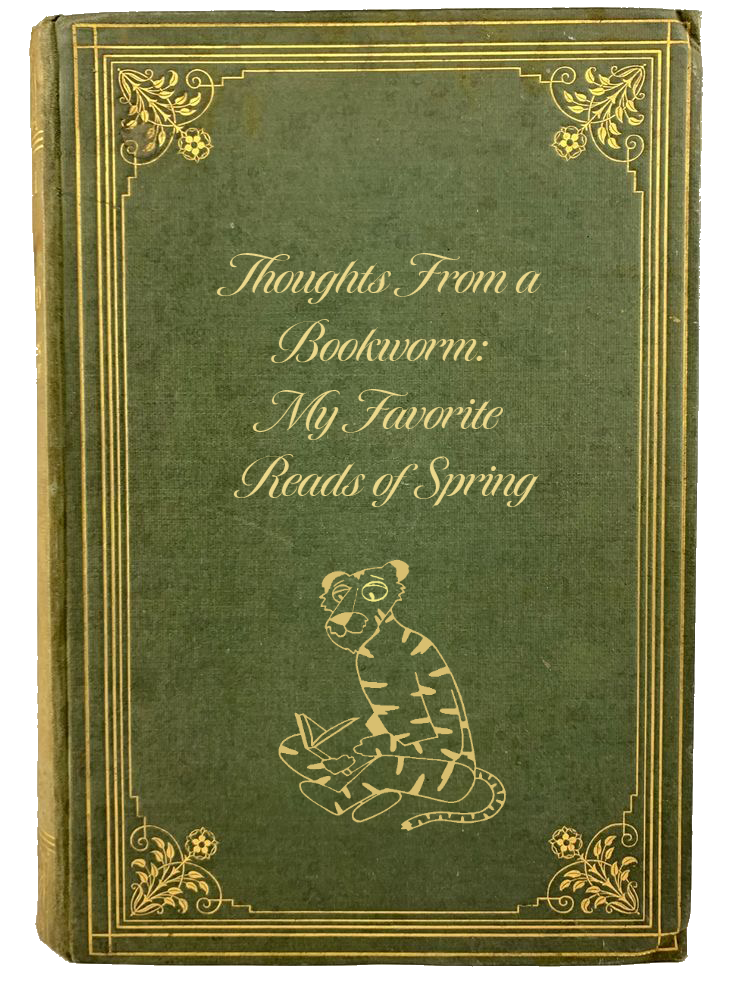
Emma Bulman
Spring brought a variety of great reads for The Tiger's resident bookworm.
‘The Bell Jar’ by Sylvia Plath:
This semester, I revisited one of my favorite novels of all time: Sylvia Plath’s semi-autobiographical novel “The Bell Jar.” I was once again reminded of the remarkable, unflinching genius and vulnerability of Plath’s writing, which rendered her a standout writer among her generation.
The novel, set in the 1950s, follows Esther Greenwood through a tumultuous summer, with her time interning for a women’s magazine, her experience as an honors college student and eventually, receiving mental health treatment in a psychiatric hospital. The novel explores the 1950s dating scene, gender roles, depression and the uncertainties of being a young adult through the intelligent yet disparaging eyes of Greenwood. Eventually, Esther’s struggle with her identity, her depression and societal and academic pressure lead to a mental breakdown.
I feel as if “The Bell Jar” has taken on a role in the classic American literature genre as a type of “sad girl” narrative or a novel that is nothing more than depressing and bleak. Plath’s genius book is so much more than the stereotypes “The Bell Jar” and her other works receive at face value.
“The Bell Jar,” amid its display of struggles with American society and depression, has a sharp sense of humor. Through the absurd and hypocritical actions Esther sees other characters do in the book, the novel provides a genius, precise evaluation of American culture and patriarchy.
Greenwood is a complex literary figure who will make readers feel both disturbed and seen simultaneously. Plath’s novel is truly a genius work of literature, and for many in college, the academic and social pressure Esther faces is incredibly relatable, even 54 years after its initial publication.
‘Bunny’ by Mona Awad:
Mona Awad’s “Bunny” is a darkly funny and bizarre (in the best way possible) novel that follows Samantha Mackey, a Master of Fine Arts student at one of the most elite creative writing programs in the country.
Amid a writer’s block spell, Mackey is given the chance to become close with the “bunnies,” the four other girls in her creative writing cohort whom she and her best friend, Ava, fiercely dislike and try to avoid. After going to the “bunnies” creative workshops, Samantha realizes that the clique is more than a group of overly attached, ridiculous, twee rich girls.
Samantha finds herself faced with a creative cult, incorporating rituals that bring monstrous creations and violence, all in the name of their literary work. As Samantha is sucked into the “bunnies” world, she slowly loses her grip on reality and her own identity.
“Bunny” deals with themes of female friendships, cliques, creativity, loneliness and the struggle to hold onto one’s identity amid groupthink. Awad’s strange, mesmerizing writing provides a dark, satirical commentary on creativity, elitism within academia and the absurdities displayed in the art world.
Awad expertly builds tension in the novel, so much so that I did not want to stop reading. Her writing captivated me, and the novel had me scared yet intrigued to find the eerie details within Awad’s characters and unique plot. “Bunny” is the perfect read for those craving a dark academia or satirical horror novel.
‘Ellipsis’ by Ellie Owen:
Ellie Owen’s “Ellipsis” is a unique love story that begins with a dark tone. Thea Scriven, a waitress in New York City, longs deeply to be a published author to the point where she feels like it’s the only achievement that will give her life meaning. After facing years of rejections from publishers on the work she poured her heart and energy into, she stands on the Brooklyn Bridge in a suicidal state. Thea gives herself a dark ultimatum: she has five years to accomplish her dream.
The book picks up with six months left on Ellie’s life clock. She spends her nights working on her manuscripts as she pursues a romantic relationship with her boss, Aaron Mariani. Ellie’s luck (and potentially fate) shifts when she runs into Adrian Friedman while waitressing, as Adrian poses as a disruptor in the projection of her career and love life.
Owen’s novel is deeply emotional, callous and dryly funny. It explores the darkness of Scriven’s mental health and aspirations, while also examining hope and love. I found Owen’s writing and storyline refreshing and nuanced within the contemporary romance genre, and her amazing writing will be sure to move readers, not just through the romantic relationships explored within the novel, but also with Scriven’s relationship to her dreams and passions.
‘Rebecca’ by Daphne du Maurier:
“Rebecca” is a classic gothic novel centered around a young, unnamed narrator who marries Maxim de Winter, an older man psychologically haunted by his deceased wife, Rebecca. As the narrator becomes Mrs. Winter and tries to navigate running Maxim’s expansive household, she cannot resist her obsession with Rebecca and her mysterious hold over both Maxim and his household staff.
Rebecca’s memory torments Maxim, leading him to treat his young wife with neglect and coldness. As the narrator tries to make sense of her new, unhappy marriage and Maxim’s emotional ghosts, she becomes haunted by the unknown of her husband and his previous wife’s past relationship.
Daphne du Maurier’s novel is a compelling and entertaining gothic novel that deals with ghosts of the past. Although “Rebecca” was published in the 1930s, the story and du Maurier’s writing style seemed shockingly contemporary to me. Overall, I found the novel to possess a timelessness in its writing, and it’s sure to captivate readers with its beautiful prose and eerie story.